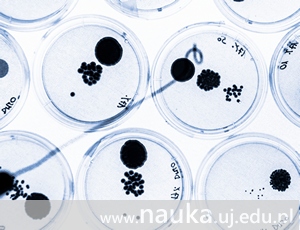
Microorganisms are everywhere. It's not unexpected, then, to ask about their interaction with babies who are still in their mothers' wombs or left it just a few months earlier. Is womb a sterile environment? And what happens after birth? Is there a sudden onslaught of bacteria? Dr hab. Tomasz Gosiewski from the JU Medical College Chair in Microbiology sheds some light on the issue.
1Question is a series of articles by the University Marketing science communication unit, in which specialists and experts from various fields briefly discuss interesting issues related to the world, civilisation, culture, biology, history, and many more.
The human body is a complex machine, with cells serving as its basic building bricks. Cells do not work individually – they form diverse tissues and organs with various functions. The grand total of cells in our bodies reaches an unimaginable number of 1013, which equals to 10,000,000,000,000 cells. It may seem to be the most surprising features of our bodies… but nothing could be more wrong.
We're not alone – and by that, I don't mean that we live with our families or in communities. Our bodies are hosts to a multitude of tenants, the number of which exceeds tenfold the number of our own cells. I'm speaking, of course, about microbes, which have colonised every possible nook and cranny on our planet, including us. To better visualise their numbers, just imagine that there may be as much as two kilograms of bacteria in the average adult's gastrointestinal tract. This "microbiota", as it's called, coexists with us from the earliest moments of our lives until our death, without ever harming us.
So, we have company, and surprisingly enough, it's harmless to us. Why, then, are we so prejudiced towards bacteria? Why do we call them "germs" or "microbes"? The fact is that very few of them cause diseases, while the vast majority is not detrimental to our health. We have identified over 1,000 bacteria which inhabit our bodies, with about two hundred of them living inside us at any given moment.
Babies and bacteria
 For nine months, the human foetus develops in the safety of the womb. Placenta, connected to the foetus by the umbilical cord, is working very closely with the mother's mucous membrane. Placenta is a tissue which belongs to the foetus. It serves as a protective barrier, filtering out undesirable substances, while at the same time removing those which are no longer needed. The inside of the womb is considered to be physiologically sterile (except for intrauterine diseases), i.e. it's devoid of microorganisms. Therefore, the foetus should remain sterile as well. However, recent research shows that this might not be entirely true – some kinds of bacteria may be able to get into amniotic fluid and, consequently, into the foetus. This is confirmed by the results of meconium testing (meconium is the earliest stool of any mammalian infant).
For nine months, the human foetus develops in the safety of the womb. Placenta, connected to the foetus by the umbilical cord, is working very closely with the mother's mucous membrane. Placenta is a tissue which belongs to the foetus. It serves as a protective barrier, filtering out undesirable substances, while at the same time removing those which are no longer needed. The inside of the womb is considered to be physiologically sterile (except for intrauterine diseases), i.e. it's devoid of microorganisms. Therefore, the foetus should remain sterile as well. However, recent research shows that this might not be entirely true – some kinds of bacteria may be able to get into amniotic fluid and, consequently, into the foetus. This is confirmed by the results of meconium testing (meconium is the earliest stool of any mammalian infant).
The largest scale colonisation (not to be confused with infection) takes place during birth, when the baby is squeezed through the mother's genital canal. The canal is inhabited by various bacteria, mainly from the Lactobacillus, Bifidobacterium and Prevotella genera. They are swallowed by the newborn, and end up in its intestines.
Currently, many births are delivered via Caesarean section, not always for medical reasons. In such cases, the babies have no chance of being naturally colonised by bacteria from their mothers' vaginas. Instead, they are colonised by an entirely different bacterial flora, such as Straphylococcus, Clostridium, Propionibacterium and Corynebacterium, many of which are potentially harmful. Babies born through C-section have a lesser amount of Bifidobacterium in their system. That type of bacteria is considered to be crucial in stimulating intestinal immunity.
Pre-term birth also impacts the characteristics of intestinal microbiota. It was proven that a lot of preemies have less plentiful colonies of Bifidobacterium and Bacteroides (which are anaerobes, i.e. they do not require oxygen), and more plentiful colonies of Enterococcus, Enterobacter or Staphylococcus (which, by contrast, are aerobes, meaning that they require oxygen). These bacteria are a very common causes of infection.
Another aspect which influences the bacterial flora of infants is the method of feeding. Mother's milk, which contains Bifidobacterium, is the natural source of nourishment for the first few months. Artificial milk substitutes do not have this type of bacteria, which disturbs the intestinal microbiota.
Bacteria – our best buddies?
In the Middle Ages, our communities were decimated by epidemics caused by poor hygiene. Today, we're on the other side of the spectrum – we're obsessed with sterility, which results in other diseases.
Commensal bacteria – the type that normally inhabits our bodies – are mostly present in our gastrointestinal tract, mouth, skin, and upper respiratory tract. So, are they anywhere else if we are healthy? We have believed so for a long time, but recently we found out that that may not be the case. Furthermore, their presence helps us to deal with the really harmful ones, blocking them from invading us. Intestinal microbiota stimulates proper development of our immune system during early childhood and actively participates in digestive processes throughout our entire lives.
The progress that we made in medicine and general quality of life shows no clemency towards our microscopic companions. Antibiotics, high sanitary standards and nearly sterile food have dramatically decreased the risk of infection. Unfortunately, every rose has a thorn. Antibiotics are not able to recognise "enemy bacteria" from "ally bacteria" – they are like an atomic bomb, indiscriminately obliterating everything in their area of effect. A lot of diseases, like asthma, allergies, chronic digestive system diseases, obesity, and even diabetes, are all tied to disturbances in microbiota, which in turn are caused by antibiotics or artificially sterilised food. Moreover, since the food we eat is so heavily processed, we cannot increase the numbers of beneficial bacteria in our bodies. We're getting away from nature, and that has a profound negative effect on our health. In the Middle Ages, our communities were decimated by epidemics caused by poor hygiene. Today, we're on the other side of the spectrum – we're obsessed with sterility, which results in other diseases.
Original text: www.nauka.uj.edu.pl





